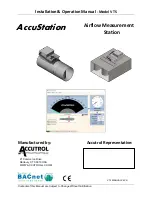
40
would enter 30000 into the box. If you want a line every 5 minutes, you would
enter 300000 into the box.
15. When you have entered the value you want, click on OK and OK in the
Properties dialog box.
16. Go the Transfer menu and select “Send
Text
File…” (NOT Send File…).
17. Browse and select the text “script” file you created.
18. Click Open.
19. The program will begin “executing” your script file, reading one line at a time
with the line delay you specified and the flow device will respond by sending one
line of data for each poll it receives, when it receives it.
You can also capture the data to another file as described in the manual under
“Collecting Data”. You will be simultaneously sending it a script file and capturing
the output to a separate file for analysis.
Operating Principle
All M-Series Gas Flow Meters (and MC-Series Gas Flow Controllers) are based on the
accurate measurement of volumetric flow. The volumetric flow rate is determined
by creating a pressure drop across a unique internal restriction, known as a Laminar
Flow Element (LFE), and measuring differential pressure across it. The restriction is
designed so that the gas molecules are forced to move in parallel paths along the
entire length of the passage; hence laminar (streamline) flow is established for the
entire range of operation of the device. Unlike other flow measuring devices, in
laminar flow meters the relationship between pressure drop and flow is linear.
Please visit the Alicat web site for a detailed explanation this principle.
http://www.alicat.com/technical-information/theory-of-operation/
STANDARD GAS DATA TABLES:
Those of you who have older Alicat products
may notice small discrepancies between the gas property tables of your old and
new units. Alicat Scientific, Inc. has incorporated the latest data sets from NIST
(including their REFPROP 9 data where available) in our products’ built-in gas
property models. Be aware that the calibrators that you may be using may be
checking against older data sets such as the widely distributed Air Liquide data.
This may generate apparent calibration discrepancies of up to 0.6% of reading on
well behaved gases and as much as 3% of reading on some gases such as propane
and butane, unless the standard was directly calibrated on the gas in question.
As the older standards are phased out, this difference in readings will cease
to be a problem. If you see a difference between the Alicat meter and your in-
house standard, in addition to calling Alicat Scientific at (520) 290-6060, call the
manufacturer of your standard for clarification as to which data set they used in
their calibration. This comparison will in all likelihood resolve the problem.
















































